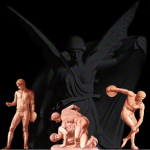Are visions hallucinations or transcendent experiences? Biologist J.B.S. Haldane said, “The Universe is not only queerer than we suppose, but queerer than we can suppose.”
A few years ago, I participated in a Native American sweat lodge ceremony. Eight of us squeezed into a small hut that usually seated four. The medicine man poured water over hot stones, placing more stones and pouring more water every few minutes, to maintain a constant temperature above 100 degrees.
I was expecting a serene experience, basking in the soft glow of a warm fire, as we drifted into a state of meditative bliss. That’s not what happened.
The ceremony was conducted in total darkness, so that we could not even see our hands in front of our faces. Soon, the hut became so hot and humid that we laid on the ground to find the cool air. As soon as the door closed, the medicine man began chanting and drumming in his native tongue.
The effect was dramatic, disorienting and disturbing, and it produced a response. During the ceremony, one of the women had a vision of a white wolf. To her, the wolf symbolized her lone nature, and the color suggested her purity of intention. She felt cleansed and comforted by her vision.
People can have powerful experiences when they get a shock to the system from a hallucination, a near-death experience, a meditative bliss, a seizure or stroke, or a sweat lodge ceremony. Even a piece of art or music or view of nature can evoke a powerful experience.
Some Bon and Tibetan Buddhist practitioners undertake “dark retreats” for days or weeks, seeking these extraordinary visions.

What Happened with the White Wolf?
After the ceremony, the medicine man hosted a meal at his home. His walls were covered with bookcases, displaying his extensive assortment of Native American writings, as well as his formidable collection of books by leading mystics and philosophers of many world religions and by well-known experts in biology, chemistry and physics.
I did not see the wolf in the sweat lodge, and I asked about it. “Everything is energy,” he explained,“ and we perceive the energy differently. When we have visions, we see them through our own filters. According to our conditioning, some people see Jesus or Mary, some see Krishna or Shiva, some see a bright light, and some see a white wolf.”
I know several people who have had these kinds of visions, and they can be powerful experiences, sometimes changing forever the ways that they think about life and death.
I believe their reports, and I trust that they truly had powerful experiences. At the same time, I often test the medicine man’s theory, asking them if they think that they actually encountered Jesus or Krishna or a wolf or if they think that they actually encountered an indescribable mystery (that they described as Jesus or Krishna or a wolf, because that is what they expected to see.)
In my small sample, all of the people believed that they had powerful experiences. Half of them believed that their brains were playing tricks on them, describing exactly what they expected to see. The other half do not know whether their brains were playing tricks on them or not. Perhaps, others are convinced that their experiences are “real,” but how could they know that?
From a theological standpoint, what are we to make of visions that are reported in our scriptures, such as Paul’s vision of Jesus in the Bible? Did Paul see Jesus because he expected to see Jesus? As I discussed here, are we more likely to credit some experiences and to discredit others, depending on whether they are consistent with our own cultures and worldviews?
Mystery
There are a lot of phenomena that we do not (yet?) understand and that we might never understand. For example, we are all conscious, but none of us can explain what it means to be conscious. Many of us have experienced or witnessed a compelling mystery, such as an extra-sensory perception, a near-death experience, a past life recollection, or an unexpected healing.
Mystery does not necessarily suggest anything supernatural. There are plenty of mysterious things in the natural world that are counter-intuitive, paradoxical or unexpected:
- Energy and matter are two aspects of the same reality.
- Energy can be be observed as either particles or waves.
- Objects are not as solid as they appear, and space is not as empty as it appears.
- Particles can become entangled, influencing each other across the room or across the universe.
- Scientists describe the universe as fields, not objects — ever-changing, fluid and interconnected.
- Space and time are interdependent, and space/time is relative, appearing differently to different observers.
- We are participants, not observers, in reality, and observation influences outcomes.
Are visions hallucinations or transcendent experiences? As biologist J.B.S. Haldane said, “The Universe is not only queerer than we suppose, but queerer than we can suppose.”
Is it any wonder that a white wolf might show up in a sweat lodge?
The Way is a Silver winner in the 2024 Nautilus Book Awards in the Religion/Spirituality of Other Traditions category.
If you want to stay up to date on the latest from You Might Be Right, simply subscribe with your email.














